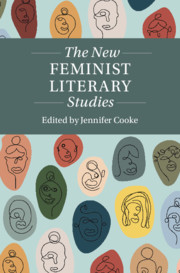Book contents
- The New Feminist Literary Studies
- Twenty-First-Century Critical Revisions
- The New Feminist Literary Studies
- Copyright page
- Contents
- Illustrations
- Contributors
- Introduction
- I Frontiers
- II Fields
- Chapter 7 Feminism and Literary Disability Studies
- Chapter 8 Feminism’s Critique of the Anthropocene
- Chapter 9 Queer Feminism
- Chapter 10 Social Reproduction: New Questions for the Gender, Affect, and Substance of Value
- III Forms
- Bibliography
- Index
Chapter 8 - Feminism’s Critique of the Anthropocene
from II - Fields
Published online by Cambridge University Press: 16 November 2020
- The New Feminist Literary Studies
- Twenty-First-Century Critical Revisions
- The New Feminist Literary Studies
- Copyright page
- Contents
- Illustrations
- Contributors
- Introduction
- I Frontiers
- II Fields
- Chapter 7 Feminism and Literary Disability Studies
- Chapter 8 Feminism’s Critique of the Anthropocene
- Chapter 9 Queer Feminism
- Chapter 10 Social Reproduction: New Questions for the Gender, Affect, and Substance of Value
- III Forms
- Bibliography
- Index
Summary
The Anthropocene is the new designation for our current geological epoch in which human activity has decisively altered earth ecosystems and the fossil record in ways that will be measurable by the geologists of our uncertain future. This chapter investigates the relationship between feminist thinking and the Anthropocene, establishing the gendered dimensions of environmental crisis, and considering how feminist thinkers have approached a range of ‘environment’ topics, including feminised constructions of ‘Nature’; the masculinism of capitalism, technology, science, and environmentalism; and the colonial erasures of the ‘Anthropocene’. This critical work is part of a long-tradition of intersectional environmental activism, which intersects with wider gender-rights campaigns, including reproductive rights and health, autonomy and equality, representation and participation, struggles against class oppression and racism, and feminist and queer critiques of militarisation, extractionism, and colonialism. Ultimately, new feminist understandings of the Anthropocene investigate and further intersectional ecological activism and seek to improve the material conditions of women’s lives.
Keywords
- Type
- Chapter
- Information
- The New Feminist Literary Studies , pp. 113 - 128Publisher: Cambridge University PressPrint publication year: 2020
- 4
- Cited by

